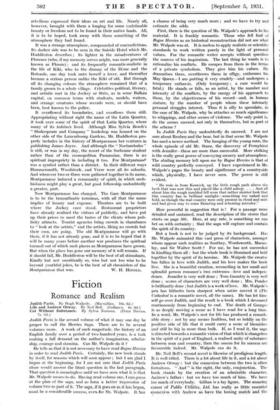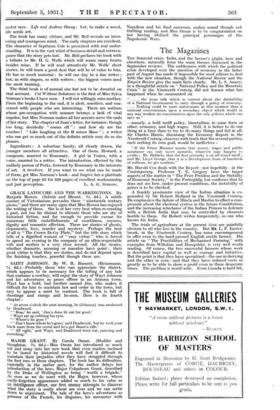Fiction
Romance and Realism
Judith Paris is the second volume of what it may one day be proper to call the Herries Saga. There are to be several volumes more. A work of such magnitude, the history of an English family over a period of two hundred years, is a task making a full demand on the author's imagination, scholar- ship, courage and stamina. Can Mr. Walpole do it ?
He tells us that it is not necessary to have read Rogue Herries in order to read Judith Paris. Certainly, the new book stands by itself, for reasons which will soon appear ; but I am glad I began at the beginning, for I am not sure that Judith Paris alone would answer the blunt question in the last paragraph. That question is meaningless until we have seen what it is that Mr. Walpole means to do. Having read volume one, I can gucss at the plan of the saga, and so form a better impression of volume two as part of it. The saga, if it goes on as it has begun, must be a considerable success, even for Mr. Walpole. It has
a chance of being very much more ; and we have to try and estimate the odds.
First, there is the question of Mr. Walpole's approach to his material. It is frankly romantic. Those who fell foul of
Rogue Herries as an historical reconstruction did not see what Mr. Walpole was at. It is useless to apply realistic or scientific standards to work written purely in the light of personal values. For the romantic writer accepts without question the sources of his inspiration. The last thing he wants is to rationalize his conflicts. He escapes from them in the terms of a private symbolism. They give him his values. He dramatises them, overthrows them in effigy, enthrones his May Queen—I am putting it very crudely—and undergoes a temporary catharsis. (Only temporary ; a cure would be fatal.) He stands or falls, as an artist, by the number and intensity of the conflicts, by the energy of his approach to them, by the objectiveness of his record—and, in human stature, by the number of people whom these intensely personal struggles interest. Thus it is silly to speculate, in the case of Mr. Walpole, why he attaches so much significance to whippings, and other scenes of violence. The only point is, do the scenes succeed, not only in themselves, but as part of
the scheme ?
In Judith Paris they undoubtedly do succeed. I am not sure about Reuben and the bear, but in that scene Mr. Walpole has used a newer method. The hanging of the young man, the whole episode of old Mr. Stane, the discovery of Fernyhirst with Jennifer—these are more than successful. More striking is the really great power of conveying scenery and atmosphere. The abiding memory left upon me by Rogue Herries is that of wild country perfectly conveyed. I have experienced in Mr. Walpole's pages the beauty and significance of a countryside which, physically, I have never seen. The power is still evident.
" He rode in from Keswick, up the little rough path above the beck that was now thin and placid like a child asleep. . . . And all about him the rough tumbled fell wore that rather sinister look that this country has in brilliant sunlight—something too naked and bold, as though the real country were only present in cloud and mist and had given way to some flaunting and scheming intruder."
How powerful in suggestion that is ! For a passage more detailed and sustained, read the description of the storm that starts on page 501. Here, at any rate, is something we can bet on with certainty ; that the saga will capture and contain the spirit of its country.
But a book is not to be judged by its background. Has Mr. Walpole animated this vast press of characters, amongst whom appear such realities as Southey, Wordsworth, Macau- lay, and Sir Walter Scott ? For me, he has not succeeded in kindling them all : but the whole book is illumined and held together by the spirit of its heroine. Mr. Walpole the creator has fallen in love with Judith, and his love makes the book live. She is a beautiful creation, reconciling in her small and splendid person romance's two extremes—love and indepen- dence. Jennifer is very well done ; Tom Gauntry is very well done ; scores of characters are very well done ; Mrs. Ponder is brilliantly done ; but Judith is a work of love. Mr. Walpole's pen has hitherto been sharpest when satire moved it (The Cathedral is a romantic novel, all the same). He has let him- self go over Judith, and the result is a book which I devoured continuously from beginning to end. The death of Georges is as deeply moving a scene as I have read for a long time. In a word, Mr. Walpole's zest for life has produced a remark- able story : not by any means faultless, but so boldly on the positive side of life that it could carry a score of blemishes and still be big in more than bulk. If, as I read it, the saga is directed towards a romantic vision of that which is-changeless in the spirit of a part of England, a realised unity of substance between man and country, then the omens for its success are favourable_ indeed. Mr. Walpole can do it.
Mr. Neil Bell's second novel is likewise of prodigious length. It is well titled. There is a lot about life in it, and a lot about Andrew Otway : but the connexion between the two is often
fortuitous. And " is the right, the only, conjunction. The book stands by the creation of an admirable character, Andrew's father : but we have too much of him. We have too much of everybody. Gillian is a lay figure. The amazing cateer of Public Utilities; Ltd. has really as little essential connexion with Andrew as have the boxing match and the motor race. Life and Andrew Otway : but, to make a novel, life needs art.
The book has many virtues, and Mr. Bell reveals an inter- esting and courageous mind. The early chapters are excellent. The character of Septimus Cole is presented with real under- standing. It is in the vast whirl of business detail and extrava- gance that the story gets last. Mr. Bell prefaces his book with a tribute to Mr. H. G. Wells which will warm many hearts besides mine. If he will read attentively Mr. Wells' short stories, he will learn a good deal that will be of value to him. He has so much material : he will one day be a fine writer ; but, as with singers, so with writers ; the biggest voices need the most training.
The third book is of normal size but not to be dwarfed on that account. Cat Without Substance is the first of Miss Sylva Norman's books I have seen. I will not willingly miss another. From the beginning to the end, it is alert, sensitive, and con-
cerned with people who are interesting. There are authors whose pre-occupation with manner betrays a lack of vital impulse, but Miss Norman makes all her accents serve the ends of her story. The chapter of Jean's letter, for instance, though too long, decidedly " comes off " : and how sly are the touches ! " Like laughing at the B minor Mass " ; a writer who can get so much out of the definite article may do as she pleases.
Ingredients : A suburban family, all clearly drawn, the younger members all attractive. One of them, Howard, a composer, married to Rosemary. A girl in Venice, with a voice, married to a ratter, The introduction, effected by the unlikely person of Perks, fostered by Rosemary in the interests of art. A revolver. If you want to see what can be made of them, get Miss Norman's book—and forgive her a platitude on the top of page 62 for 320 pages of excellent workmanship































 Previous page
Previous page